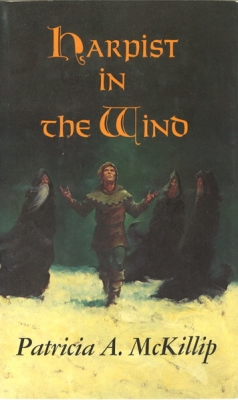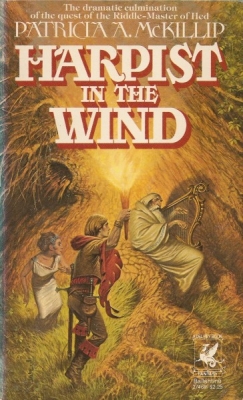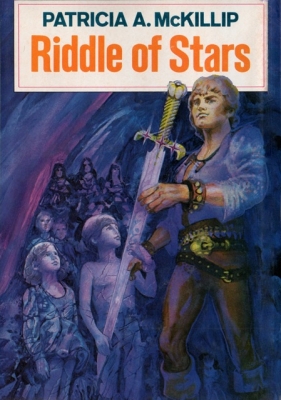The Golden Age of Science Fiction: Harpist in the Wind, by Patricia A. McKillip
The Locus Awards were established in 1972 and presented by Locus Magazine based on a poll of its readers. In more recent years, the poll has been opened up to on-line readers, although subscribers’ votes have been given extra weight. At various times the award has been presented at Westercon and, more recently, at a weekend sponsored by Locus at the Science Fiction Museum (now MoPop) in Seattle. The Best Fantasy Novel Award dates back to 1978, when it was won by J.R.R. Tolkien’s The Silmarillion. The award was not presented in 1979, and when it was reinstituted in 1980, this time permanently, Patricia A. McKillip won the award for Harpist in the Wind. In 1980. The Locus Poll received 854 responses.
The 1980 award season seems to have been a good year for final books in trilogies. Just as Dragondrums, the final volume of Anne MCCaffrey’s Harper Hall trilogy received the coveted Balrog Award, the final volume of Patricia A. McKillip’s Riddle-Master trilogy, Harpist in the Wind, won the Locus Poll for Best Fantasy Novel. Apparently, it was also the award season for musically-oriented fantasy novels. One of the biggest differences between Dragondrums and Harpist in the Wind is also what makes McCaffrey’s novel easier to read on its own.
In Dragondrums, McCaffrey continued her story, but had a different protagonist, moving the main character of the earlier two books to a supporting role. Harpist in the Wind is very much the final volume of a story that was begun n 1976 with the publication of The Riddle-Master of Hed. The continuation, Heir of Sea and Fire, was published in 1977. In Harpist in the Wind, released by Atheneum Books in 1979, McKillip wraps up various threads and relationships that were introduced in the earlier books. She offers reminders of went before this volume, but the three book story arc is complex enough that they only spur familiarity for those who have read the previous books, not enough for someone who only picks the book up as an award winner.
The novel opens with Morgon, the Riddle-Master of Hed, sitting still on a tower in An alongside Raederle of An. The two quickly leave the kingdom of her family to travel to Hed and then on to confront Ghisteslwchlohm in Lungold, and then on to find the High One to ultimately figure out what Morgon’s role in life is, the meaning of the stars on his forehead, and to re-set the ultimate peace of the land since earlier in the series the land law which formed an intrinsic part of McKillip’s world had been upended.
While Morgon and Raederle’s relationship seems tenuous at times, with the reader wondering if they really belong together, McKillip does excel in other areas of the story, bringing her strange world to life. When the characters are traveling on the road through war-torn Ymris, McKillip provides the feeling that they are just two on a road full of refugees, a sensation which is often lacking in fantasy novels.
Harpist in the Wind was not meant to stand on its own, but rather as the conclusion of a lengthy novel which introduced complex questions. Its purpose is to provide answers and closure, and it succeeds in those tasks. McKillip introduces aspects of Christian mythology such as the legend of the Fisher King to further develop her concept of land-law, taking that idea from an hereditary one to something much more important in Morgon’s character arc. Enemies and allies are not always what they seem and decisions which were made earlier and raised questions are shown to have been even more consequential than originally portrayed.
The other top five novels for the Locus Award included (in order of finishing) The Dead Zone by Stephen King, Tales of Neveryon by Samuel R. Delany, Castle Roogna by Piers Anthony, and The Merman’s Children, by Poul Anderson.
 Steven H Silver is a sixteen-time Hugo Award nominee and was the publisher of the Hugo-nominated fanzine Argentus as well as the editor and publisher of ISFiC Press for 8 years. He has also edited books for DAW and NESFA Press. He began publishing short fiction in 2008 and his most recently published story is “Webinar: Web Sites” in The Tangled Web. Steven has chaired the first Midwest Construction, Windycon three times, and the SFWA Nebula Conference 6 times, as well as serving as the Event Coordinator for SFWA. He was programming chair for Chicon 2000 and Vice Chair of Chicon 7.
Steven H Silver is a sixteen-time Hugo Award nominee and was the publisher of the Hugo-nominated fanzine Argentus as well as the editor and publisher of ISFiC Press for 8 years. He has also edited books for DAW and NESFA Press. He began publishing short fiction in 2008 and his most recently published story is “Webinar: Web Sites” in The Tangled Web. Steven has chaired the first Midwest Construction, Windycon three times, and the SFWA Nebula Conference 6 times, as well as serving as the Event Coordinator for SFWA. He was programming chair for Chicon 2000 and Vice Chair of Chicon 7.



“Harpist in the Wind was not meant to stand on its own, but rather as the conclusion of a lengthy novel which introduced complex questions. Its purpose is to provide answers and closure, and it succeeds in those tasks. McKillip introduces aspects of Christian mythology such as the legend of the Fisher King to further develop her concept of land-law, taking that idea from an hereditary one to something much more important in Morgon’s character arc. Enemies and allies are not always what they seem and decisions which were made earlier and raised questions are shown to have been even more consequential than originally portrayed.”
Surely this — and McKillip’s prose — render moot the defense of DRAGONDRUMS that it stands alone better. HARPIST IN THE WIND is the superior novel, full stop. In my opinion.
(Also, isn’t DRAGONDRUMS technically Science Fiction? So how did it win a Balrog.)
The Riddlemaster trilogy has been on my reread list for a while. I loved it as a teen but wasn’t aware enough to appreciate her prose. That is no longer a problem. My wife and I have read many of her standalone novels, and her wordcraft always leaves us in awe.